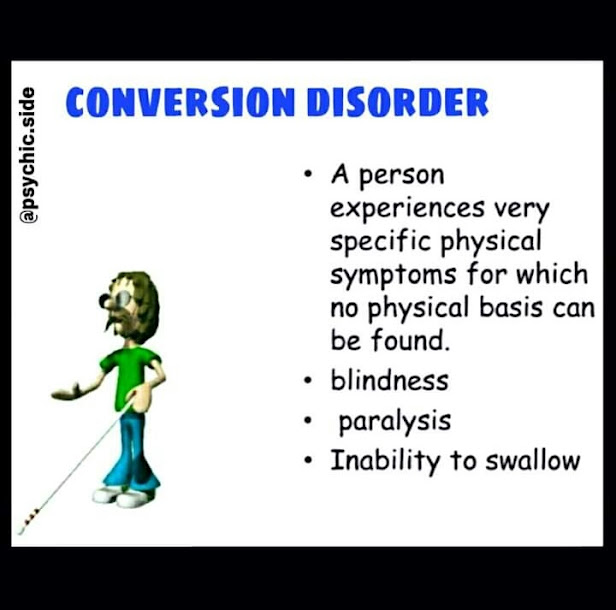NEUROLOGICAL DISORDERS (conversion, Dissociative, somatoform disorders)
Conversion disorder
• Presence of deficits affecting motor or sensory function suggesting a medical or neurological disorder.
• Development of symptoms usually in the presence of significant psychological stressor.
• Temporal relationship between stressor and development of symptoms.
• Patient does not intentionally produce the symptoms.
• Detailed physical examination do not reveal any abnormality that can explain the symptoms.
• The symptoms may have a symbolic relationship with the stressor.
• Sudden onset.
Types of disturbance
1) Dissociative motor disorders - motor disturbance involves paralysis or abnormal movements.
2) Dissociative sensory disorders - sensory disturbance involves sensation blindness, deafness, touch, pain.
3) Dissociative convulsions - it is characterised by presence Convulsive movement and partial loss of consciousness.
Treatment plans for conversion disorder :
Behaviour therapy - aversion therapy, free association.
Psychotherapy with abreaction - supportive psychotherapy, hypnosis, free association.
Psychoanalysis.
Drug therapy - thiopentone, amytal, diazepam, Benzodiazepines etc.
Dissociative disorder
Clinical features
• Disturbance in the normally integrated functions of consciousness, identity or memory.
• Sudden onset and disturbance is usually temporary.
• Temporal relationship between stressor and onset of the illness.
• Detailed physical examination and investigation do not reveal any abnormality that can explain the symptoms.
Types of Dissociative disorder
1) Dissociative amnesia - it is inability to recall important personal information, particularly concerning traumatic life events. The amnesia can not be explained by everyday forgetfulness and there is no evidence of an underlying medical illness.
2) Dissociative fugue - Episodes of wandering away ( usually away from home ) during the episode the person usually adopt a new identity with complete amnesia, onset is usually sudden and in the presence of severe stress.
3) Multiple personality disorder - Two or more personality, only one is manifest at a time. Personalities is different at times even opposing one personality is not aware of existence of other due to Amnesic barrier.
4) Trance and possession disorder - it is characterised by the control of persons personality by a spirit during the episodes . Person is aware of existence of the other unlike in multiple personality.
Treatment plans for Dissociative disorder :
Behaviour therapy - aversion therapy, free association.
Psychotherapy - supportive psychotherapy, hypnosis.
Psychoanalysis.
Drug therapy - thiopentone, amytal, diazepam, Benzodiazepines etc.
Somatoform disorder
• It is Characterised by repeated presentation with physical symptoms which do not have any adequate physical basis.
• A persistent request for investigation and treatment despite repeated assurances by the treating doctors.
• Extreme focus on physical symptoms — such as pain or fatigue — that causes major emotional distress and problems functioning. You may or may not have another diagnosed medical condition associated with these symptoms, but your reaction to the symptoms is not normal.
Following categories
1) Somatisation disorder - Extreme focus on physical symptoms — such as pain or fatigue — that causes major emotional distress and problems functioning. You may or may not have another diagnosed medical condition associated with these symptoms, but your reaction to the symptoms is not normal.
2) Hypochondriasis - People with this type are preoccupied with a concern they have a serious disease. They may believe that minor complaints are signs of very serious medical problems. For example, they may believe that a common headache is a sign of a brain tumor.
3) Somatoform autonomic dysfunction -
Symptoms are presented by the patient as if they were due to a physical disorder of a system or organ that is largely or completely under autonomic innervation and control, i.e. the cardiovascular, gastrointestinal, respiratory and urogenital systems. The symptoms are usually of two types, neither of which indicates a physical disorder of the organ or system concerned. First, there are complaints based upon objective signs of autonomic arousal, such as palpitations, sweating, flushing, tremor, and expression of fear and distress about the possibility of a physical disorder. Second, there are subjective complaints of a nonspecific or changing nature such as fleeting aches and pains, sensations of burning, heaviness, tightness, and feelings of being bloated or distended, which are referred by the patient to a specific organ or system.
Treatment plans for somatoform disorder :
Supportive Psychotherapy, behaviour modification, relaxation therapy, physical exercises, antidepressants, benzodiazepines etc.






Keep supporting us 😊
ReplyDeleteWell written
ReplyDeleteThank you ☺️
Delete